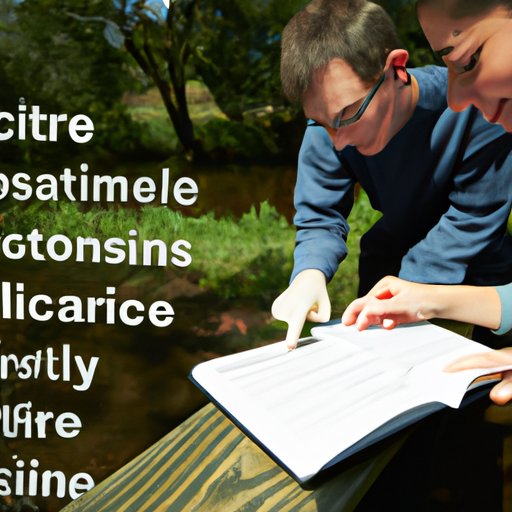Introduction
Citizen science is an important and growing field that engages members of the public in scientific research. It involves individuals gathering data and contributing to research projects, often with the help of technology. Citizen science projects can be found in many fields, from astronomy to zoology, and offer a unique opportunity for individuals to get involved in science and make a difference in the world.

A Comprehensive Guide to Citizen Science Projects
Before we dive into the specifics of citizen science projects, let’s start by exploring what they are. Citizen science projects involve members of the public participating in various research activities. These projects often involve collecting data or providing observations, although some may require more in-depth involvement. The data collected is then used by researchers to further their work.
What are Citizen Science Projects?
Citizen science projects vary in scope and complexity. Some may involve simply observing and recording data, while others may require more in-depth involvement. Examples of citizen science projects include counting animals, recording weather patterns, tracking migration patterns, and mapping land use. There are even projects that involve playing video games to help researchers study human behavior.
Types of Citizen Science Projects
Citizen science projects can be divided into two main categories: observational and experimental. Observational projects typically involve collecting data about a particular phenomenon or environment. This could include things like counting birds, measuring water quality, or recording weather patterns. Experimental projects involve manipulating variables to observe the effects on a particular outcome. This could include things like testing the effectiveness of different types of fertilizer on plant growth.
Finding Citizen Science Projects
With so many citizen science projects available, it can be difficult to know where to start. Fortunately, there are a number of websites and resources available to help you find the right project for you. Zooniverse, SciStarter, and iNaturalist are all great resources for finding citizen science projects. You can also search for local projects in your area.

Exploring the Benefits of Citizen Science
Citizen science offers a variety of benefits to participants. From engaging with your community to gaining new skills and knowledge, there are plenty of reasons to get involved in citizen science projects.
Engaging with Your Community
Citizen science projects provide a great opportunity to engage with your community. You can join local groups or organizations to participate in projects, or even start your own. By engaging with your community, you can help make a difference in your local area and beyond.
Contributing to Research
By participating in citizen science projects, you can contribute to important research initiatives. Your data and observations will be used to further scientific understanding and advance our knowledge of the world. It’s a great way to make a real difference in the world.
Gaining New Skills and Knowledge
Participating in citizen science projects is also a great way to gain new skills and knowledge. You’ll learn about the topic of the project, as well as the scientific process. This experience can be invaluable if you’re considering a career in science or just want to expand your knowledge.
Citizen Science: What is it and How Can You Get Involved?
Now that you know a bit more about citizen science projects, let’s explore how you can get involved. There are a few steps you can take to get started with citizen science.
Getting Started with Citizen Science
The first step to getting involved in citizen science is to find a project that interests you. As mentioned earlier, there are a number of websites and resources available to help you find the right project. Once you’ve found a project, the next step is to read up on the details and determine if it’s something you’d like to participate in.
Finding Volunteer Opportunities
Once you’ve chosen a project, the next step is to find volunteer opportunities. Many citizen science projects are run through universities or other research organizations, so it’s a good idea to contact them directly to inquire about volunteering. You can also search online for volunteer positions or contact local organizations that may be running citizen science projects.
Understanding the Risks and Rewards
It’s important to understand the risks and rewards associated with participating in citizen science projects. While the rewards can be great, there are also potential risks. For example, some projects may require you to travel to remote locations or work with hazardous materials. It’s important to weigh the pros and cons before committing to a project.
10 Fascinating Citizen Science Projects to Participate In
If you’re looking for a citizen science project to get involved in, here are 10 of the most fascinating projects out there.
Zooniverse
Zooniverse is a platform that hosts a variety of citizen science projects. Projects range from classifying galaxies to transcribing historical documents. It’s a great way to get involved in a variety of projects without having to commit to one in particular.
Bird Counts
Bird counts are an important part of bird conservation efforts. Volunteers can help identify and count the number of birds in a given area, which can then be used to track species populations. It’s a great way to help protect birds and their habitats.
Galaxy Zoo
Galaxy Zoo is a popular citizen science project that involves classifying galaxies. Participants are asked to look at images of galaxies and classify them based on their shapes. It’s a great way to help astronomers better understand the universe.
eBird
eBird is a project that focuses on bird conservation. Participants are asked to record bird sightings and submit them to the database. This data can then be used to track bird populations and help protect their habitats.
Earth Challenge 2020
Earth Challenge 2020 is a global citizen science project that aims to collect environmental data from around the world. Participants can contribute data on air quality, water quality, and other environmental factors. It’s a great way to help protect the planet.
Climate Watch
Climate Watch is a project focused on tracking climate change. Participants are asked to record temperature, precipitation, and other climate data. This data can then be used to better understand climate change and its impacts.
NestWatch
NestWatch is a project focused on bird conservation. Participants are asked to monitor nests and report their findings to the database. This information can then be used to track bird populations and help protect their habitats.
FrogWatch USA
FrogWatch USA is a project focused on amphibian conservation. Participants are asked to observe and record frog and toad calls. This data can then be used to track amphibian populations and help protect their habitats.
Project Noah
Project Noah is a project focused on wildlife conservation. Participants are asked to photograph and document wildlife in their area. This data can then be used to track animal populations and help protect their habitats.
Great Sunflower Project
The Great Sunflower Project is a project focused on pollinator conservation. Participants are asked to observe and record bee activity in their area. This data can then be used to track bee populations and help protect their habitats.

Citizen Scientists: Making a Difference in the World
Citizen scientists play an important role in society by making a difference in the world. Their contributions to research and conservation efforts have a real impact on our world.
Citizen Science’s Impact on Society
Citizen science has had a significant impact on society. By engaging citizens in research projects, we can better understand the world around us. This knowledge can then be used to improve our lives, from helping us better prepare for natural disasters to aiding in the development of new technologies.
Citizen Science’s Role in Conservation
Citizen science also plays an important role in conservation efforts. By collecting data and providing observations, citizen scientists can help identify threats to the environment and develop solutions to address them. This helps protect our planet and its inhabitants.
Citizen Science’s Global Reach
Finally, citizen science has a global reach. With projects spanning the globe, citizen scientists can help make a difference in countries around the world. This allows us to better understand the needs of other cultures and work together to create a better future.
Conclusion
Citizen science projects provide a unique opportunity for individuals to get involved in science and make a difference in the world. From engaging with your community to contributing to research, there are plenty of benefits to participating in citizen science projects. Whether you’re looking for a way to make a difference or just want to gain new skills and knowledge, there’s a citizen science project for you.
(Note: Is this article not meeting your expectations? Do you have knowledge or insights to share? Unlock new opportunities and expand your reach by joining our authors team. Click Registration to join us and share your expertise with our readers.)
